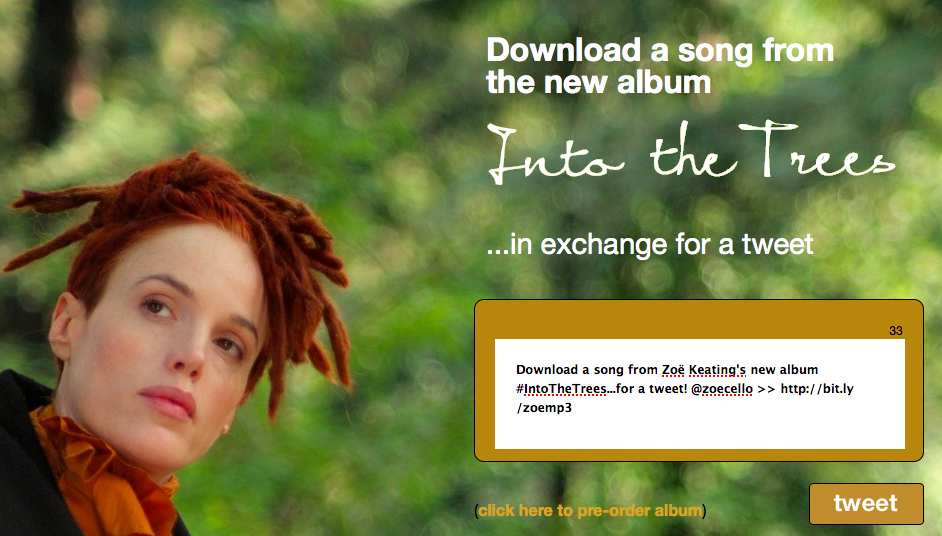Disclaimer: This originally appeared on the in-house blog for social media tracking tool RockDex. As the response the post received attests, Zoe Keating’s insights about establishing true connections with fans on Twitter are applicable to anyone looking to use social media to benefit their musical career.
What unsigned artist wouldn’t kill to have 1.4 million Twitter followers?
As the old channels die out, social media is where music fans are gathering. Yet musical artists who aren’t celebrities have little choice but to grow their online fanbases much in the same way that they build audiences on tour: by working hard, being there and showing individual fans that they value their support on a personal level.
The story is no different for Zoe Keating. The classically trained, experimental cellist even has it a bit tougher, given her chosen medium: one-woman instrumental composition with cello and computerized loops.

Yet here she sits with 1,377,141 Twitter followers and counting. And that massive follower base was arrived at in large part by luck. But many of them have stuck around because Keating gives them reasons to.
The big questions: Has that follower base made @ZoeCello an Internet celebrity? Kind of. It’s gotten her some media attention, at least. Has it made her rich or prompted her to rest on her laurels? Nope and nope.
“I don’t like to get wrapped up in the numbers and stuff,” Keating says over the phone from her house north of San Francisco. “I like to be me and to do things naturally and organically. Ultimately, I’m not a marketer, I’m a musician.”
We first got a glimpse of Keating’s damn-the-numbers approach to fanbase building last week. Following a blog post in which we crunched some of her social media numbers using RockDex, Keating set us straight that it’s personal interaction, not web traffic, that she cares about more.
First, she tweeted us her feelings on MySpace, which is one of the sites we at RockDex monitor for artists. She told us it was dead to her, in no uncertain terms. Next, she hit us with a one-two punch about how her strategy for establishing fan connections is “slow, steady and real.”
Naturally, we wanted to talk to her. Tracking numbers and data is of course a big part of what we do at RockDex, but it’s not all we care about. Numbers are important, but musicians aren’t factories churning out products. They’re artists with lives and personalities.
But first, seriously, how does an unsigned classical musician get a million followers on Twitter?
Zoe knows that were it not for the people at Twitter appointing her unbidden to the suggested users list (the list of prominent users that Twitter automatically suggests to anyone who sets up a new account), she wouldn’t have gained so many followers so fast.
However, it was her early adoption of the platform that presumably influenced the Twitter-powers-that-be to name her a suggested user.
A former information architect for a tech company in San Francisco during the dotcom boom and then later for the Research Libraries Group, Zoe began using Twitter as a way to track tech news. At first, she says, it had nothing to do with her music. Then, as social networking sites began to prove more useful to musicians, she was among the first to take advantage.
“I’ve just been doing this for a long time,” she explains. “Before Twitter, there was MySpace, and I was one of the first to sign up on MySpace before it started allowing music accounts. … So I’ve just always been doing this stuff. It was a gradual process. My career has taken years — that was the secret that wasn’t a secret.”
Despite the boost of being on the suggested user list, Keating prefers gradual growth over numbers-oriented campaigns.
“I don’t believe in the marketing push. For an artist just starting out, having that marketing push to make a big splash won’t be very long-lasting. My strategy is to get the person next door interested, and the person next door might get their friends interested. I’m in this for my career, not just a one-off thing.”
Still, she’s not afraid to try new things.
Earlier this month, mainly as an experiment, Keating offered up a free song from her upcoming album, Into the Trees, to fans in exchange for a tweet.
After researching platforms that would’ve charged her to build the tweet-for-mp3 mechanism, Zoe plied her tech savvy and did it herself using Twitter OAuth, with help from her friend Jesse von Doom of Cashmusic.org. She even created a custom bit.ly link to track the experiment. As RockDex showed, hundreds of fans responded.

But again, this type of promotion isn’t typical of Zoe. Nor are things like charging money for tweets, Kim Kardashian-style. “I’ve definitely been approached by people who wanted me to advertise things for them in my tweets, and I’ve always refused,” she says.
“It’s a really valuable medium as a way to express myself, and I don’t want to mess with that,” she continues. “One of things about Twitter that’s good for me is it allows people to see me as a three-dimensional person.”
She knows that of her nearly 1.4m followers, the percentage of people who go from being casual @ZoeCello followers to true Zoe Keating fans is small, but she’s not going to stop tweeting anytime soon.
“I feel like I’m not actively trying to convert people to be my fans. However, I feel like it’s an opportunity to have a broader audience. It’s up to me to convince them that I’m worth their time. I feel strongly that by being myself, I can make that happen. It’s still the chance to have an audience that I wouldn’t have had before,” she says.
“Instead of shouting into an empty room, I’m shouting at a huge party. If in that huge party, only one person hears, I’ll take that one.”
At RockDex, we make no bones about our biz: We do track data, sure. But bigger than that is our mission to empower artists like Zoe with the ability to use their social media data to make business decisions. (By the way, Zoe hadn’t heard of RockDex until that initial blog and is not currently a customer.) And as we build and improve our platform, we continually strive to marry the quantitative with the qualitative.
Because even if you do have the numbers — or don’t — it won’t do you much good without possessing that element Zoe Keating has consistently defined. Being real.
To learn more about RockDex, visit our website.